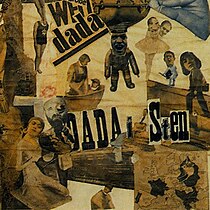Hannah Höch
| Hannah Höch | |
|---|---|

Hannah Höch self-portrait, c.1926
|
|
| Born |
Anna Therese Johanne Höch November 1, 1889 Gotha |
| Died | May 31, 1978 (aged 88) Berlin |
| Nationality | German |
| Education | Berlin College of Arts and Crafts |
| Known for | Collage |
| Notable work | Cut with the Kitchen Knife through the Beer-Belly of the Weimar Republic, 1919 |
| Movement | Dada |
 |
|
| Images | |
|---|---|
|
|
|
| Video | |
|
|
Hannah Höch (German: [hœç]; November 1, 1889 – May 31, 1978) was a German Dada artist. She is best known for her work of the Weimar period, when she was one of the originators of photomontage. Photomontage, or, fotomontage, is a type of collage in which the pasted items are actual photographs, or photographic reproductions pulled from the press and other widely produced media. Höch's work was intended to dismantle the fable and dichotomy that existed in the concept of the “New Woman'': an energetic, professional, and androgynous woman, who is ready to take her place as man's equal. Her interest in the topic was in how the dichotomy was structured, as well as in who structures social roles.
Hannah Höch was born Anna Therese Johanne Höch in Gotha, Germany. Although she attended school, domesticity took precedence in the Höch household. In 1904, Höch was taken out of the Höhere Töchterschule in Gotha to care for her youngest sibling, Marianne. In 1912 she began classes at the School of Applied Arts in Berlin under the guidance of glass designer Harold Bergen. She had chosen the curriculum in glass design and graphic arts, rather than fine arts, to please her father. In 1914, at the start of World War I, she left the school and returned home to Gotha to work with the Red Cross. In 1915 she returned to school, entering the graphics class of Emil Orlik at the National Institute of the Museum of Arts and Crafts. Also in 1915, Höch began an intimate relationship with Raoul Hausmann, a member of the Berlin Dada movement. Höch's involvement with the Berlin Dadaists began in earnest in 1917. After her schooling, she worked in the handicrafts department for Ullstein Verlag (The Ullstein Press), designing dress and embroidery patterns for Die Dame (The Lady) and Die Praktische Berlinerin (The Practical Berlin Woman). The influence of this early work and training can be seen in her later work involving references to dress patterns and textiles. From 1926 to 1929 she lived and worked in the Netherlands. Höch made many influential friendships over the years, with Kurt Schwitters and Piet Mondrian among others. Höch, along with Hausmann, was one of the first pioneers of the art form that would come to be known as photomontage.
...
Wikipedia
